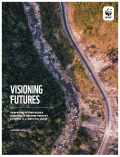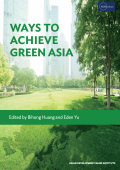Visioning Futures: Improving infrastructure planning to harness nature’s benefits in a warming world

This report outlines a new planning approach integrating considerations of natural capital and ecosystem services, climate risks and resilience, and sustainable development needs to support social-ecological system scale planning. It provides key recommendations for global and local institutions influential in infrastructure development, from multilateral development banks and other funders to NGOs and the private sector, to address these gaps and facilitate an improved planning approach.

This report provides a comprehensive analysis of the environment and climate change in Asia. It first gives an overview of the environmental challenges facing the region and summarises the economic impacts of climate change. It also offers in-depth discussions of environmental regulations, environmental governance, environmental evaluation, and the growth of carbon markets in Asia.
The purpose of this Country Planning Framework (CPF) is to detail how GGGI will support the government of Ethiopia to plan and implement the Climate Resilient Green Economy (CRGE) vision between 2016 and 2020.
Food companies are not only at risk due to water scarcity, they are also responsible for it. Agriculture is rapidly draining aquifers in many regions of the world, and meat production is one of the biggest polluters of watersheds globally. This report provides investors with guidance and relevant data for evaluating the water risk management of 40 major companies in the agricultural products, beverage, meat, and packaged food industries. It also tracks their progress in managing their water risks as compared to performance in 2017 and 2015. This analysis can help food companies manage their water risks more effectively, which is critically important to their bottom lines.
This report provides the most up-to-date information on the disaggregated impacts of climate change for marine and inland fisheries and for aquaculture, in the context of poverty alleviation and the differential dependency of countries on fish and fishery resources. The work is based on model projections, data analyses, and national, regional, and basin-scale assessments. Overall, the results indicate that climate change will lead to significant changes in the availability and trade of fish products, with potentially important geopolitical and economic consequences, especially for those countries most dependent on the fisheries sector.
